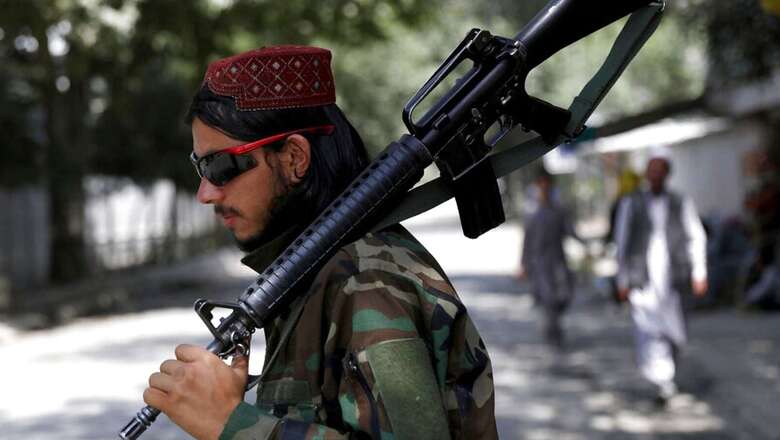
views
Events over the last few weeks show that Taliban are finally settling down to govern Afghanistan, with the last American soldier departing and officially ending the American and NATO engagement in the country. The next obvious question for us in India is: whether or not that means diversion of Taliban militants to Kashmir Valley? While it is an important question of strategic defence and foreign affairs, for people of Kashmir, it means coming face to face with one of the most radicalized militant organizations of South Asia, which can have deadly consequences for an already ravaged Kashmir Valley. So how good are the chances of Taliban militants being pushed to Kashmir valley, to reignite militancy?
Officially, Taliban’s stand is that Kashmir is a bilateral issue between India and Pakistan and Taliban have no role in it whatsoever. But since Taliban’s control lies in the hands of Pakistani ISI, its civil government and army, the chances of Taliban getting entangled into Kashmir are very high, especially given the geographical proximity of Afghanistan and Kashmir Valley. As it is, history of modern Afghanistan sending its Pashtun militants to fight in Kashmir insurgency is as old as the history of militancy in Kashmir Valley itself.
In early 1990s, when insurgency in Kashmir Valley began, Taliban were not even in existence and Afghanistan was reeling under bitter and devastating civil war between rival Afghan mujahideen groups, who were fighting with each other to gain control of Kabul after the withdrawal of USSR. During this time, Pakistan’s ISI diverted a lot of out-of-work Afghan mujahideens to Kashmir Valley to fight in anti-India insurgency. It is said that by 1993 alone, nearly 400 Afghan mujahideen of Hezb-e-Islami of Afghan war lord Gulbuddin Hekmatyar were present in Kashmir Valley, a number which increased subsequently.
In the first two decades of Kashmir insurgency, out of a total of nearly 16,000 militants killed, about 3,000 were of foreign origin, mainly Afghan mujahideens and Pakistani Punjabis. It took nearly quarter of a century for Indian armed forces to finally get Kashmir Valley back to a semblance of normalcy. The foreign militancy part was subsequently taken over by Pakistani-Punjabi militant organizations of Lashkar-e-Taiba and Jaish-e-Mohammad.
But can history really repeat itself in Kashmir Valley today?
The answer to the question is quite complicated. The chances of physical intrusion by Taliban militants into Kashmir Valley are quite thin and even some of those, who may be successful in intruding Kashmir Valley, may not be able to do much damage either. There are concrete reasons behind this. First and foremost, Kashmir of today is much different from Kashmir of early 1990s both in terms of our defence preparedness, manning of LoC and Kashmir Valley’s own internal social conditions.
Second, advanced technological systems are used for guarding and monitoring nearly the entire stretch of LoC within Kashmir Valley and Jammu region; from night-vision cameras, defence satellite imagery to drones. The LoC which was hopelessly permeable in 1990s is tightly sealed now, which is reflected in a dip in cross-LoC infiltration of militants from Pakistan-occupied Kashmir to Kashmir Valley. So, any chance of Pakistan trying to push a large contingent of Taliban militants into Kashmir Valley at a scale similar to 1990s is next to impossible.
Third and most importantly, there is a general sense of collective fatigue among people of Kashmir Valley after nearly three decades of relentless death and destruction that not only destroyed the economy of Kashmir and brought governance to its knees but also ended up achieving nothing. The abrogation of Articles 370 and 35A of the Constitution of India was the last nail in the coffin, which made all Kashmiris realize the futility of militant insurgency. Not only did Kashmir not get anything out of this messy confrontation, it also led to rupture of Kashmiri society with forced exodus of Kashmiri Hindu Pandits, religious radicalization of Kashmiri society. The resulting lawlessness further pushed Kashmir Valley towards drugs, crime and religious extremism. I don’t think people of Kashmir Valley want a repeat of any of that once again by facilitating return of Afghan militants in Kashmir valley.
Does this mean that we have nothing to worry about Taliban?
No, we still have a lot to worry about Taliban. While Taliban may not be capable of sending their militants physically into Kashmir Valley, the ideology of Taliban can easily penetrate the minds of Kashmiri youth and inspire them to once again aspire for something that our earlier generations did and ended up destroying Kashmir. The rise of a religious puritanical state in Afghanistan, which runs solely on Shariah and is guided by doctrines of Deoband School, can have psychological impact on the younger generation of Kashmiris, a section of whom has been aspiring to turn Kashmir Valley into a similar religious puritanical state. It is the impact of what Taliban do in Afghanistan and how far will they go in implementing the codes of Shariah which has the potential of pushing the next generation of Kashmiri youth towards violence and insurgency. This is a problem that will be faced not only by Kashmir Valley but all Muslim-majority countries surrounding Afghanistan, including Pakistan, Tajikistan and Uzbekistan.
Our focus therefore should be to confront the ideology of Taliban, which is based on extreme and puritanical interpretation of Islam, something that is not compatible with the moderate and secular character of Kashmir Valley, which is based on syncretic Hindu-Muslim culture of Kashmiriyat, an amalgamation of Sufi Islam and Kashmiri Hindu Shaivism. It is important to make sure our youth in Kashmir don’t idolize Taliban and eulogize their regressive, intolerant and violent ideology, which can push Kashmir Valley once again into the dark abyss of death and destruction, from which people of Kashmir are desperately trying to come out.
Javed Beigh is State General Secretary of People’s Democratic Front. He fought DDC elections from Beerwah constituency of Central Kashmir’s Budgam district. He can be reached @javedbeigh. The views expressed in this article are those of the author and do not represent the stand of this publication.
Read all the Latest News, Breaking News and Assembly Elections Live Updates here.


















Comments
0 comment